NEW DELHI, Sep 8: The recently banned Chinese mobile app, “Player Unknown’s Battlegrounds” (PUBG), an online multiplayer battle royale game developed and published by PUBG Corporation, a subsidiary of South Korean video game company Bluehole, has decided to severe its relations with Chinese Tech major Tencent Games and start publishing the games by itself in India.
‘Sensor Tower’ a Data Analytics firm had quoted Battle Royale’s PUBG Mobile to have seen a global revenue gain of Rs 9,731 crore in the first half of this year. It brings its lifetime collection to nearly Rs 22,457 crore with the highest number of downloads in India which ranks at the top with 175 million installs. With people staying home owing to the Covid-19 pandemic and lockdowns, the PUBG revenues hit a record high of around Rs 2,021 crore in March.
A statement released by the company in its official blog post reiterated: “PUBG MOBILE is the mobile version of PLAYERUNKNOWN’S BATTLEGROUNDS (PUBG), an intellectual property owned and developed by PUBG Corporation, a South Korean gaming company. The company is actively engaged in developing and publishing PUBG on multiple platforms, including PUBG MOBILE in select territories, to provide the best player experiences possible.
“PUBG Corporation fully understands and respects the measures taken by the government as the privacy and security of player data is a top priority for the company. It hopes to work hand-in-hand with the Indian government to find a solution that will allow gamers to once again drop into the battlegrounds while being fully compliant with Indian laws and regulations.
“The company explores ways to provide its own PUBG experience for India shortly. It is committed to doing so by sustaining a localised and healthy gameplay environment for its fans,” it said.
PUBG Corporation said it was committed to providing a unique battle royale experience to a global audience and hoped to continue engaging with its passionate player base in India.
The move to severe ties with Tencent seems to stem from the fact that Indian consumers form the bulk of its revenue. The company apparently want to pacify the Indian authorities who only a week ago banned the app along with few more apps as part of security measures under section 69A of the Informational Technology (I.T) Act. The game before the enforcement of the ban was played by around 13 million users daily. The business loses, seem to have jolted Bluehole.
With the ban, India had joined three other countries – Iraq, Jordan and Indonesia to enforce a country-wide ban. Though both Nepal and Pakistan had also placed a ban, it was later revoked by the authorities.
In China too the game was banned but after the company changed and agreed to align with socialist values and traditional Chinese morals, the game minus shedding of blood and depicting less violence and re-named as ‘Game of Peace’ was approved. In South Korea, the game is marketed and distributed by Kakao Games.
(Venkatesh Iyer)

